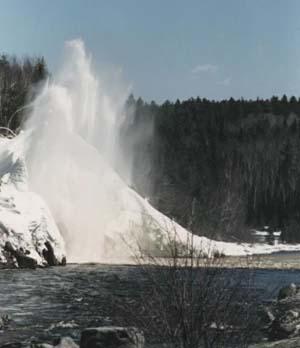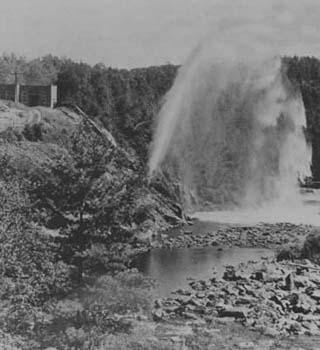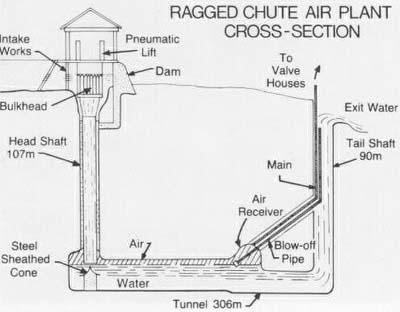
Ragged Chute Compressed Air Plant
Nature Produces Compressed Air
At Ragged Chute, 16 km southeast of Cobalt on the Montreal River, stands
the world's only water-powered compressed air plant.
Built in 1910, at the peak of the Cobalt silver boom, Ragged Chute Compressed
Air Plant transmits air-power to the local mining industry. Compressed air,
rather than electricity, is the main power source used by heavy mining equipment
such as drilling machines, grinders and hoists. Today, though, most mines
purchase electricity to run their own air compressors.
 The late Charles H. Taylor
invented the hydraulic air compressor while living in Montreal. One spring
he observed the movement of the Ottawa River and, as water flowed over a
dam and under the ice, noticed that peculiar domes rose from the surface
of the ice. When they were pierced, compressed air escaped.
The late Charles H. Taylor
invented the hydraulic air compressor while living in Montreal. One spring
he observed the movement of the Ottawa River and, as water flowed over a
dam and under the ice, noticed that peculiar domes rose from the surface
of the ice. When they were pierced, compressed air escaped.
To Taylor's creative mind, the explanation was simple - when a mixture of
air and water is compressed, the air separates and rises. The air compresses,
and not the water, because the molecules in a liquid are already very close
together and, therefore, are almost impossible to compress.
Using this principle, Taylor determined that an efficient method to harness
hydraulic air-compression would be to drop the air-water mixture through
a shaft to an underground chamber. He designed the chamber in such a way
as to allow the water to flow through, and at the same time cause the air
to compress.
In the course of his experiments, Taylor discovered that the air pressure
and horsepower created could be increased or decreased by altering the length
and diameter of the intake shaft, and by changing the volume of water entering
the works.
Since it was built in 1910, Ragged Chute has practically run itself. While
under construction, in the early years of this century, a community of workers
did live on the site.
In 1945, Ontario Hydro purchased the Ragged Chute plant and continues to
supply local mines with the compressed air created there.
Only twice in its 70-year history has the plant been closed for major repairs
although, at one time, a dozen mines purchased thousands of cubic metres
of compressed air each month.
Today, the plants and the pipes that carry the air-power to the mines are
in need of a major overhaul. But the costs would be prohibitive. As a result,
the famous geyser-like blow-off from the plant is rarely seen except on weekends
when the local mines are shut
down.
How it works
Ragged Chute was specifically designed to produce air compressed to 862.5
kPa (gauge). Its intake shaft is 107 m deep and the tunnel-chamber has a
blow-off valve to prevent increased pressure.
There are control gates to limit the amount of water entering the plant works.
As well, the two intake heads, each made up of 72, 36 cm pipes, can be raised
or lowered to maintain a constant depth over the bulkhead, usually about
46 cm of water.
From the heads, the water is fed into one pipe which widens just before the
bottom. This is designed to decrease the pressure in the pipe and allow the
air bubbles to collect and merge. At the base of the shaft are two steel-sheathed
concrete cones which break the initial impact of the air-water mixture, and
direct its flow into the horizontal chamber.
The chamber collects the compressed air and channels it to a receiver pipe,
61 cm in diameter. The receiver then carries the compressed air to a valve
house where it is transmitted to Cobalt for distribution.
The 51 cm diameter stell transmission pipe has telescopic expansion joints
every 0.8 km to allow for the effects of temperature change. The pipe is
above ground and can expand about a metre each 1.6 km on a hot, sunny day.
Compressed air must be dry because through friction, humidity decreases the
efficiency of both the pipeline and the motors using the air. Water vapor
also causes exhaust freezing in motors; the escaping air expands rapidly,
which requires a great deal of heat energy. And, finally, the moisture washes
away the lubricants within the motors.
The air transmitted from Ragged Chute is much drier than it was before
compression because the water temperature is so cold it condenses the moisture
in the air bubbles whil still in the intake shaft. The condensation then
remains with the water when the air-water mixture separates. The low humidity
of Ragged Chute air is one of the most remarkable features of the plant.
 The blow-off
valve is a 30 cm pipe beside the receiver leading to a point underwater on
the river bed. It reaches into the tunnel-chamber to the critical depth where
it rests in water as long as the air is compressed to 862.5 kPa (gauge).
But when the pressure increases, the water level within the chamber lowers
slightly, allowing the excess pressure to escape. When it does blow, a stream
of water often shoots over 30 m into the air.
The blow-off
valve is a 30 cm pipe beside the receiver leading to a point underwater on
the river bed. It reaches into the tunnel-chamber to the critical depth where
it rests in water as long as the air is compressed to 862.5 kPa (gauge).
But when the pressure increases, the water level within the chamber lowers
slightly, allowing the excess pressure to escape. When it does blow, a stream
of water often shoots over 30 m into the air.
This spectacular, geyser-like blow-off is most commonly associated with the
Ragged Chute Compressed Air Plant.
| file: /Techref/other/pump/raggedchute.htm, 5KB, , updated: 2004/11/5 18:54, local time: 2025/1/7 20:37,
|
| | ©2025 These pages are served without commercial sponsorship. (No popup ads, etc...).Bandwidth abuse increases hosting cost forcing sponsorship or shutdown. This server aggressively defends against automated copying for any reason including offline viewing, duplication, etc... Please respect this requirement and DO NOT RIP THIS SITE. Questions?
<A HREF="http://sxlist.com/TECHREF/other/pump/raggedchute.htm"> Ragged Chute Compressed Air Plant</A> |
| Did you find what you needed?
|
.
 The late Charles H. Taylor
invented the hydraulic air compressor while living in Montreal. One spring
he observed the movement of the Ottawa River and, as water flowed over a
dam and under the ice, noticed that peculiar domes rose from the surface
of the ice. When they were pierced, compressed air escaped.
The late Charles H. Taylor
invented the hydraulic air compressor while living in Montreal. One spring
he observed the movement of the Ottawa River and, as water flowed over a
dam and under the ice, noticed that peculiar domes rose from the surface
of the ice. When they were pierced, compressed air escaped.

 The blow-off
valve is a 30 cm pipe beside the receiver leading to a point underwater on
the river bed. It reaches into the tunnel-chamber to the critical depth where
it rests in water as long as the air is compressed to 862.5 kPa (gauge).
But when the pressure increases, the water level within the chamber lowers
slightly, allowing the excess pressure to escape. When it does blow, a stream
of water often shoots over 30 m into the air.
The blow-off
valve is a 30 cm pipe beside the receiver leading to a point underwater on
the river bed. It reaches into the tunnel-chamber to the critical depth where
it rests in water as long as the air is compressed to 862.5 kPa (gauge).
But when the pressure increases, the water level within the chamber lowers
slightly, allowing the excess pressure to escape. When it does blow, a stream
of water often shoots over 30 m into the air.